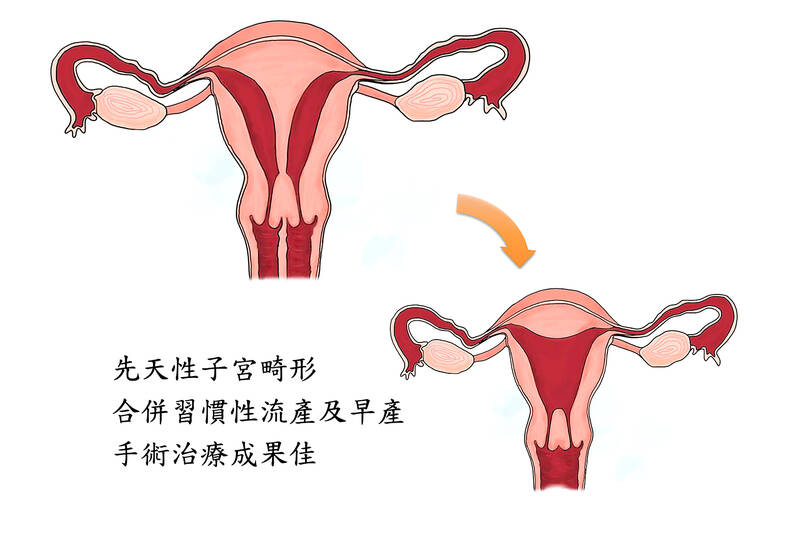National Taiwan University Hospital yesterday said that its novel method of hysteroscopic metroplasty has simplified the surgical procedure for people with a septate uterus and increased the success rate.
A septate uterus — the most common congenital uterine anomaly — is a condition in which a thin tissue membrane runs down the middle of the uterus and divides it into two parts.
A 33-year-old woman surnamed Chen (陳) said she had never had menstrual cramps and did not know she had a congenital uterine anomaly until she had difficulty getting pregnant and sought medical assistance.

Photo: Chiu Chih-jou, Taipei Times
She was found to have a complete septate uterus (CSU), with the thin septum running down the entire length of the uterus and the cervix, extending to the vagina, separating them into two, so she was transferred to a hospital, Chen said.
She received a cervix-preserving hysteroscopic metroplasty procedure at the hospital, and gave birth to a baby and is pregnant again, Chen said.
National Taiwan University Hospital Department of Obstetrics and Gynecology attending physician Yang Po-kai (楊博凱) said congenital uterine anomalies occur when an embryo is developing, and about 5 percent of all women have the condition.
A septate uterus is the most common congenital uterine anomaly, and it increases the risk of miscarriage, he said.
Although laparotomy (open abdominal surgery) is the conventional procedure for the condition, hysteroscopic metroplasty, a minimally invasive surgical procedure that involves cutting and removing the septum from the uterus, has become the most common treatment in the past few years years, Yang said.
CSU is a relatively rare condition, he said.
A hysteroscopic metroplasty for treating CSU is more difficult than other septate uterus cases, as an initial perforation needs to be made between the non-communicating cavities above the cervix to preserve the cervical architecture, he said.
The hospital said that Reproductive Endocrinology and Infertility Divison, led by Department of Obstetrics and Gynecology director Yang Jehn-hsiahn (楊政憲) performed hysteroscopic metroplasty on 58 CSU patients over the past 16 years and developed a new method with an increased success rate of initial perforation.
The team found that by applying progressively larger dilators into each of the bifurcated cervical canals, spontaneous perforations — progressive thinning of the cervical stroma, which causes the weaker portion of the septum to spontaneously tear — are applied to the uterine septum, Yang Po-kai said.
The novel surgical method improves the cervix-preserving hysteroscopic metroplasty by avoiding the need to make sharp incisions, he said.
The procedure has a higher success rate, which makes it a safer first option for all women with CSU, he added.
The team’s novel method was published in the Journal of Minimally Invasive Gynecology in September last year.

ENDORSING TAIWAN: Honduran presidential candidate Nasry Afura said that Honduras was ‘100 times better off’ when it was allied with Taipei The Ministry of Foreign Affairs yesterday said it would explore the possibility of restoring diplomatic relations with Honduras based on the principle of maintaining national interests and dignity. The ministry made the remarks in response to reporters’ questions regarding an article titled: “Will Taiwan Regain a Diplomatic Ally?” published in The Diplomat on Saturday. The article said Honduras’ presidential election in November could offer Taiwan the chance to regain an ally, as multiple candidates have promoted re-establishing diplomatic relations with Taiwan. Honduras severed diplomatic ties with Taiwan in March 2023 in favor of Beijing, but since switching its diplomatic recognition,

A fourth public debate was held today about restarting the recently decommissioned Ma-anshan Nuclear Power Plant, ahead of a referendum on the controversial issue to be held in less than two weeks. A referendum on Aug. 23 is to ask voters if they agree that “the Ma-anshan Nuclear Power Plant should continue operations upon approval by the competent authority and confirmation that there are no safety concerns.” Anyone over 18 years of age can vote in the referendum. The vote comes just three months after its final reactor shut down, officially making Taiwan nuclear-free. Taiwan People’s Party Chairman Huang Kuo-chang (黃國昌) represented

Scoot announced yesterday that starting in October, it would increase flights between Taipei and Japan’s Narita airport and Hokkaido, and between Singapore and Taipei. The low-cost airline, a subsidiary of Singapore Airlines, also said it would launch flights to Chiang Rai in Thailand, Okinawa and Tokyo’s Haneda airport between December and March next year. Flights between Singapore and Chiang Rai would begin on Jan. 1, with five flights per week operated by an Embraer E190-E2 aircraft, Scoot said. Flights between Singapore and Okinawa would begin on Dec. 15, with three flights per week operated by Airbus A320 aircraft, the airline said. Services between Singapore

‘ANGRY’: Forgetting the humiliations and sacrifices of ‘the people of the Republic of China’ experienced disqualified Lai from being president, Ma Ying-jeou said Former president Ma Ying-jeou (馬英九) yesterday criticized President William Lai (賴清德) over what he called “phrasing that downplayed Japan’s atrocities” against China during World War II. Ma made the remarks in a post on Facebook on the 80th anniversary of the end of World War II. Ma said he was “angry and disappointed” that Lai described the anniversary as the end of World War II instead of a “victory in the war of resistance” — a reference to the end of the Second Sino-Japanese War (1937-1945). The eight-year war was a part of World War II, in which Japan and the other Axis